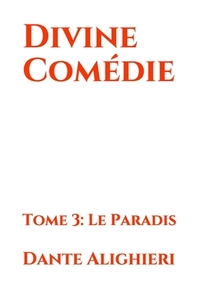You need to sign in or sign up before continuing.
Take a photo of a barcode or cover
A veritable who's who of who's going to hell.
First of all this hardcover boxed edition I have is missing the first ten or so pages, but that really only takes this from a two stars down to one.
It gets two stars because its like 85% a list of famous people from Medieval and ancient times that have gone to either hell, purgatory or heaven. I am very well versed in Greek and Roman history and even I had trouble knowing who the heck half of these flipping jokers are. It's a lot easier to read online, there's sites that directly link to the person Dante is writing about in particular and give you a breakdown of why Dante was talking about them but I honestly lost interest once I realised it was all going to be like this. I'm not here for this 14th Century TMZ/WhereAreTheyNow bullshit.
There's an @Dril tweet that actually encapsulates this entire three part poem perfectly
https://twitter.com/dril/status/473706394009759744
In case you decide reading this poem isn't worth it.
Paradiso is actually not that bad because it gets a little bit theological and you can actually learn something about faith and christian theology from it.
This sounded cooler in theory but in practice its 14th century poetry my dude's. Not that cool.
Recommended if you like 14th century poetry about who went to hell and who didn't. If this interests you let me know so I can block you.
First of all this hardcover boxed edition I have is missing the first ten or so pages, but that really only takes this from a two stars down to one.
It gets two stars because its like 85% a list of famous people from Medieval and ancient times that have gone to either hell, purgatory or heaven. I am very well versed in Greek and Roman history and even I had trouble knowing who the heck half of these flipping jokers are. It's a lot easier to read online, there's sites that directly link to the person Dante is writing about in particular and give you a breakdown of why Dante was talking about them but I honestly lost interest once I realised it was all going to be like this. I'm not here for this 14th Century TMZ/WhereAreTheyNow bullshit.
There's an @Dril tweet that actually encapsulates this entire three part poem perfectly
https://twitter.com/dril/status/473706394009759744
In case you decide reading this poem isn't worth it.
Paradiso is actually not that bad because it gets a little bit theological and you can actually learn something about faith and christian theology from it.
This sounded cooler in theory but in practice its 14th century poetry my dude's. Not that cool.
Recommended if you like 14th century poetry about who went to hell and who didn't. If this interests you let me know so I can block you.
challenging
funny
mysterious
reflective
slow-paced
Plot or Character Driven:
Character
Strong character development:
Yes
Loveable characters:
Complicated
Diverse cast of characters:
No
Flaws of characters a main focus:
Complicated
dark
fast-paced
"Faith is what gives substance to our hopes and makes us certain of realities we do not see."
In Paradiso 24: Believing is Not Seeing, Dante is ultimately questioned on faith, hope, and love by the three major apostles: Saint Peter, Saint James, and Saint John. It's important to note that up until this point, Dante has had a continuous struggle in his belief in God and faith, being led and mentored throughout the epic poem by Virgil. It is astonishing therefore to both Lady Beatrice and Saint Peter when Dante quotes Saint Paul, echoing his own personal view on faith.
I listened to The Divine Comedy as a BBC Dramatization and found the heavy text much more understandable this way. I simply loved this ending sentiment recited by Dante. The final culmination of everything a young Dante has learned is summed up within it and although the traditional words were originally spoken over 2,000 years ago (in the 1st century BC by St. Paul the Epostle), they still resonate to modern ears.
To me, hearing the epic poem largely reenacted using a more modern script while still retaining the story and much of the original text, was the perfect compromise between old and new. Especially as a younger reader, I found I got so much more out of it.
In addition, the radio play format allowed me to listen to some of my favorite actors voice beloved classic characters, like Hattie Morahan portraying Lady Beatrice and Blake Ritson as a Young Dante.
Overall, I would strongly recommend listening to Dante's Comedy in this format, especially for anyone looking to get a taste for classic literature, but not prepared to swallow whole chunks of Italian 'terza rima' or complex rhyming schemes.
In Paradiso 24: Believing is Not Seeing, Dante is ultimately questioned on faith, hope, and love by the three major apostles: Saint Peter, Saint James, and Saint John. It's important to note that up until this point, Dante has had a continuous struggle in his belief in God and faith, being led and mentored throughout the epic poem by Virgil. It is astonishing therefore to both Lady Beatrice and Saint Peter when Dante quotes Saint Paul, echoing his own personal view on faith.
I listened to The Divine Comedy as a BBC Dramatization and found the heavy text much more understandable this way. I simply loved this ending sentiment recited by Dante. The final culmination of everything a young Dante has learned is summed up within it and although the traditional words were originally spoken over 2,000 years ago (in the 1st century BC by St. Paul the Epostle), they still resonate to modern ears.
To me, hearing the epic poem largely reenacted using a more modern script while still retaining the story and much of the original text, was the perfect compromise between old and new. Especially as a younger reader, I found I got so much more out of it.
In addition, the radio play format allowed me to listen to some of my favorite actors voice beloved classic characters, like Hattie Morahan portraying Lady Beatrice and Blake Ritson as a Young Dante.
Overall, I would strongly recommend listening to Dante's Comedy in this format, especially for anyone looking to get a taste for classic literature, but not prepared to swallow whole chunks of Italian 'terza rima' or complex rhyming schemes.
adventurous
challenging
reflective
medium-paced
Plot or Character Driven:
Plot
Strong character development:
No
Loveable characters:
No
Diverse cast of characters:
Yes
Flaws of characters a main focus:
No
Passionnant mais éreintant, je vais laisser couler quelques années avant de m'attaquer au Purgatoire.
ABSOLUTELY FUCKING MASTERPIECE *CHEFS KISS* WILL NEVER GET BORED OF IT
This was probably the most difficult thing I've read in my entire life, but I really enjoyed it, and that is saying something. It is really interesting, although difficult to understand and grasp, especially since I have a hard time following the plot of things written in verse.
3.75
Sinceramente esta obra es un increíblemente buen fanfic. El worl-building es lo mejor de la obra y por lo que personalmente creo que se elevó a clásico de la literatura. Los círculos del infierno ya están presentes en el imaginario colectivo.
Por lo demás, Dante poniéndose como protagonista hizo que la historia me resultase tremendamente altanera. Es indudablemente un self-insert con prota demasiado OP (over-powered), con su golden finger (su cheat, su trampa para ganar que no depende de sus esfuerzos) siendo Beatriz quien es quien le resuelve todos los problemas.
Como Dante se va encontrando con sus ídolos que lo alaban e insertando a sus enemigos o quién él consideraba equivocado en el infierno es pretencioso a más no poder.
Sinceramente no sé como este libro consiguió sobrevivir a nuestros días. Aunque ahora yo no conozca ni la mitad de gente que menciona, en su época esto debió ser un salseo impresionante.
El final me dejó un poco cortada, demasiado abrupto. Pero estoy contenta de haberlo terminado.
Sinceramente esta obra es un increíblemente buen fanfic. El worl-building es lo mejor de la obra y por lo que personalmente creo que se elevó a clásico de la literatura. Los círculos del infierno ya están presentes en el imaginario colectivo.
Por lo demás, Dante poniéndose como protagonista hizo que la historia me resultase tremendamente altanera. Es indudablemente un self-insert con prota demasiado OP (over-powered), con su golden finger (su cheat, su trampa para ganar que no depende de sus esfuerzos) siendo Beatriz quien es quien le resuelve todos los problemas.
Como Dante se va encontrando con sus ídolos que lo alaban e insertando a sus enemigos o quién él consideraba equivocado en el infierno es pretencioso a más no poder.
Sinceramente no sé como este libro consiguió sobrevivir a nuestros días. Aunque ahora yo no conozca ni la mitad de gente que menciona, en su época esto debió ser un salseo impresionante.
El final me dejó un poco cortada, demasiado abrupto. Pero estoy contenta de haberlo terminado.




